Book 1: Chapter 2- Lessons and Life at the Macedonian Court
On fine days, the children of the Macedonian Court were to take their lessons in the amphitheater where normally plays were performed.

In the center of this amphitheater was a large and detailed mosaic depicting Greece and its neighbors.
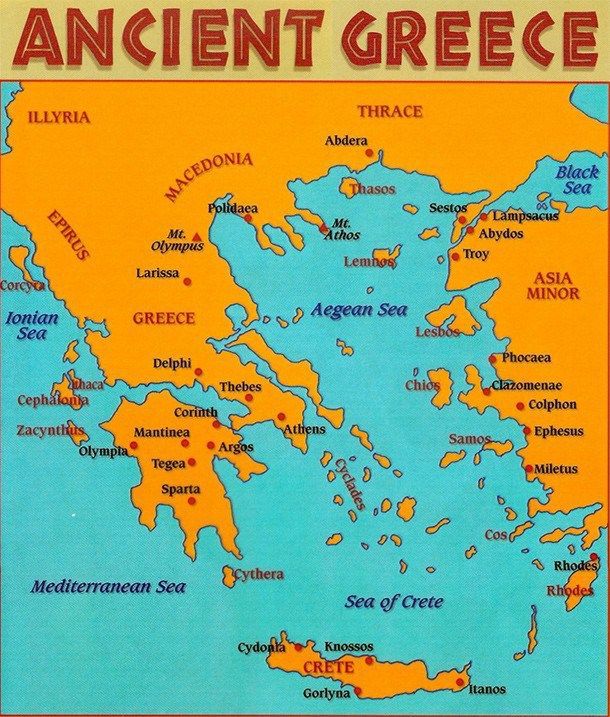

"Now," Chiron began, "Who can show us where we are on this map."
Chiron was a taller than average man with intelligent brown eyes and streaks of grey running through his long brown hair and beard. His lined face looked thoughtful and wise but also pleasant and kind. Like all the greatest philosophers in Greece, Chiron was an Athenian, Annabeth noted with smug pride.
Luke stepped forward. He placed his foot on the northernmost region of Greece: Macedonia.
"You are correct, Prince Luke," Chiron replied, "The Kingdom of Macedonia is south of the Barbarian lands of Thrace, Illyria, and Dacia, from whence we get iron ore such as gold and silver, timber, and furs," He then pointed with his staff to the two regions south of Macedonia, "Can anyone name these two regions?"
Chiron's first lesson was on the geography and recent history of Greece. The northernmost regions of Greece were Macedonia, Epirus, and Thessaly. Macedonia was ruled by King Zeus from the polis (city-state) of Thessaloniki. King Zeus's father, Kronos, conquered Macedonia's neighbor to the south, Epirus. Kronos had been a cruel tyrant who was overthrown by his three sons: Zeus, Poseidon, and Hades. After the war, King Zeus rewarded his brother Hades with the kingdom of Epirus and marriage to its princess, Persephone of House Di Angelo. Thessaly was a client state of Macedonia, run by Lord Aeolus of House Wind.
"Now, who were King Zeus's first allies in his war to overthrow the tyrant Kronos?" Chiron continued.
Annabeth raised her hand.
"House Solace of Phocis," she said, "House Wine of Boeotia, and House Chase of Attica."
The words "House Chase of Attica" dripped with conceited self-importance of both Athen's accomplishments and Annabeth's own knowledge.
Delphi, the capital of Phocis, was an important religious center, the site of the Oracle of Delphi. Athens, the capital of Attica, fancied itself the cultural center of Greece and was known for its theaters and centers of learning. Thebes, the central city of Boeotia, was notorious for its wealth, opulence, and fast living. The mountains of Northern Greece were rich in precious metals. Their dry, sun-warmed valleys were ideal for growing grapes and olives which were turned into wine and olive oil, Greece's two main exports.
"After King Zeus's initial success, which three kingdoms then joined his cause?" Chiron's question was met with silence, "Anyone...anyone?"
Percy slouched in his seat and his eyes were glazed over like his mind was far away.
"Pay attention, Seaweed Brain," Annabeth nudged him.
"Ugh," Percy groaned.
"House Argead of Argolis," Annabeth continued, "House Castellan of Arcadia, and House Atreid of Laconia."
"Wise Girl," sneered Percy, rolling his eyes.
Argolis and its neighbor Attica made up the isthmus which connected Peloponnese to mainland Greece. It was ruled by King Triptolemus of House Argead, who was King Zeus's brother-in-law and King Zeus called upon this connection to gather the forces garrisoned in Argos (Argolis's capital city) to his side. House Argead brought along soldiers from Achaea, the northernmost region of the Peloponnese, which was run by Lord Plutus of House Horae and a client state of Argolis. House Castellan were old allies of House Grace, so King Hermes sent the troops from his stronghold in Tegea. Ares of House Atreid, king of Laconia had originally sided with Kronos but changed alliances when King Zeus's forces began to win, which was fortunate for Zeus because Ares's Spartan warriors were the best in all of Greece.
The Peloponnese contained most of what little flat, fertile land Greece possessed and the people there grew the grain and grazed the cattle which feed the mainland.
Chiron approached Prince Jason and asked him to name two more of his father's allies.
"House Jackson of Crete," Jason answered, "they were aligned with House Grace because my Uncle Poseidon had married Princess Sally. The Cretans also brought the Corinthians."
Crete was one of the largest islands in the Aegean. It and its client state, Corinthia, were important trading centers. Corinthia shared the isthmus between the Peloponnese and the mainland with Argos and Attica and was ruled by Lady Amphitrite of House Triton from Corinth.
"That is correct Prince Jason," Chiron replied, "Now Princess Thalia, can you tell me where your father faced opposition?"
"Elis, my mother's kingdom, fought on the side of Kronos," Thalia replied, "My father defeated the King of Elis and his sons and would have laid that kingdom to waste but changed his mind when he saw my mother and fell madly in love with her."
As a child, Annabeth loved this romantic tale of a beautiful princess who saved her kingdom from destruction by winning the love of an invading king. When she grew up, she heard a more cynical side to the story. Court gossip said that Hera had appeared before her future husband at her most alluring. Some claimed that she wore her finest clothes and jewels and impressed him with her majesty and dignity other whispered that she had unpinned her chiton, let it fall to the ground, and tempted him with the prospect of her lithe, nymph-like body.
"Wouldn't be the first time his cock went rigid and his sword-hand went limp," they quipped.
Chiron went on to explain that following King Zeus's marriage to Princess Hera, Elis was added to House Grace's domain. Resistance was crushed for good when the Spartans subjugated Messina and turned its people into helots (Spartan slaves).
Annabeth noticed that Percy was growing restless as if it was torture for him to sit and listen to his lessons when he wanted to run off and play. He did not seem to have absorbed a single part of the lecture in his seaweed brain.
When Chiron dismissed his students, he called Percy forward. Annabeth stayed behind to listen in on what they were talking about.
"Didaskalos (teacher)," Percy replied to the summons.
"Is something wrong, Prince Percy?" Chiron asked him.
"No, Didaskalos,"
"You seemed distracted..."
"I'm sorry, I'll try harder next time."
"I know this seems boring now but a wise king learns from the past in order to make informed judgments about the future. I can only accept the best from you Percy, you must work harder."
Percy looked like a whipped puppy which caused Annabeth to let out a giggle.
"And you, My Dear," Chiron scolded her, "Need to be more humble. Hubris never leads anywhere good."
A/N please be honest, do these first few chapters feel like a boring and confusing exposition dump?
Annabeth would remember her early years at the Macedonian court as mostly happy. Lessons with Chiron took up most of the morning. He taught them about the history and geography of Greece, the family tree and adventures of the gods, enough Egyptian and Persian to be able to converse with visiting dignitaries and to speak eloquently and persuasively. In the afternoon, they were set free to play. When the weather was nice, they would go swimming in the sea or for hikes in the foothills of Mount Olympus or horseback rides to the Loudias River, where they would feed breadcrumbs to the swans and make offerings to the gods by pouring wine into the river. Percy would challenge Annabeth to races either on horseback or by swimming which, he would always win. He could swim like a dolphin and seemed to have been born in the saddle. Annabeth found that she enjoyed being competitive with Percy, though she hated losing.
When the weather was bad, they would have to play indoors. Annabeth shared a chamber with Thalia. Their personal areas were separated by fluted columns and woven hangings. The low wooden beds were softened with goose-down stuffed cushions, and linen and wool sheets. At each end of the bed was a chest for their clothes and toys.
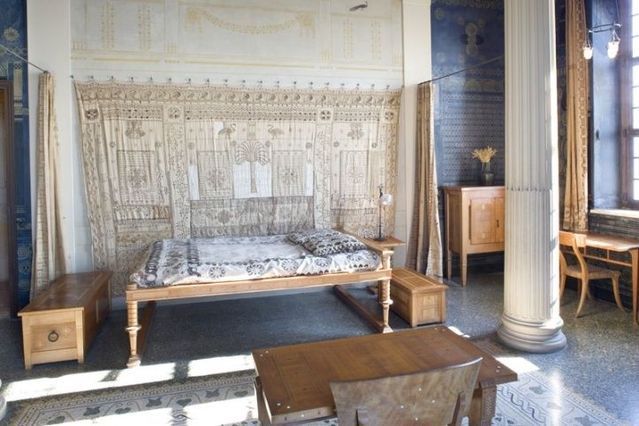
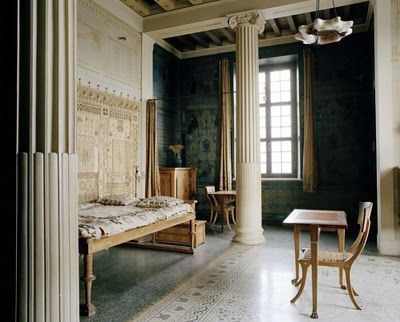
This chamber was known as the koraiceum (maidens' quarters) and the frescoes on the walls and the mosaics on floor depicted stories featuring the Maiden Goddess of the Moon and the Hunt.
Annabeth's favorite game involved her terra-cotta doll, Métis, who was carved and painted look like a well-dressed noblewoman and had moveable arms and legs.
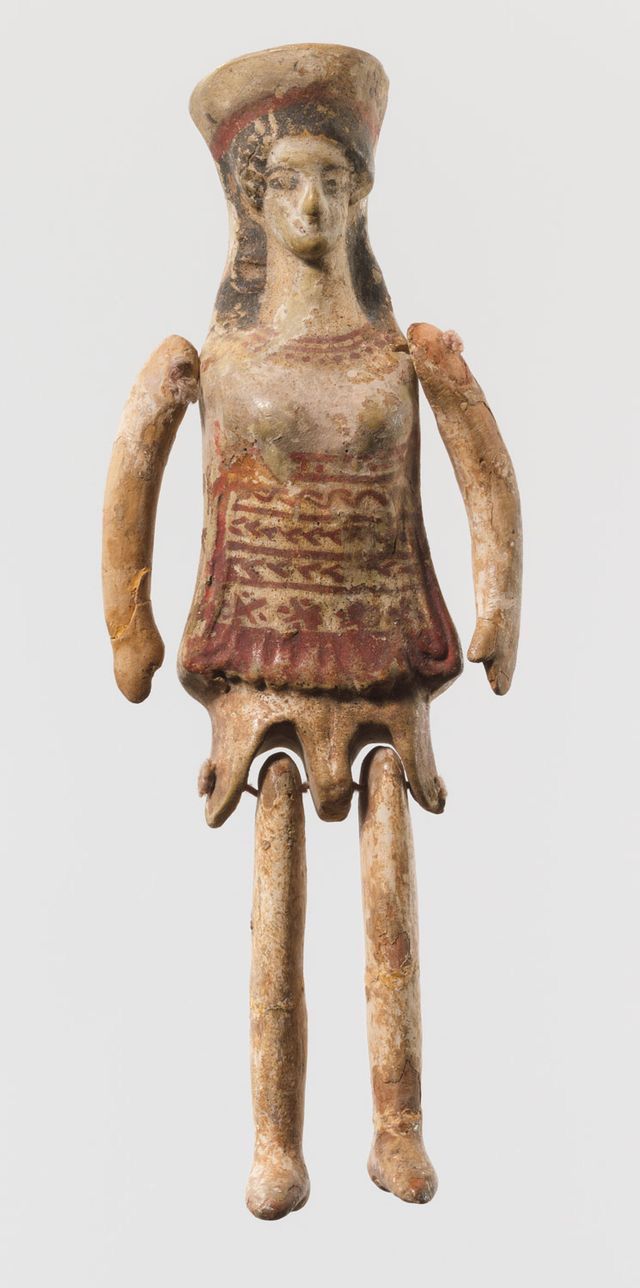
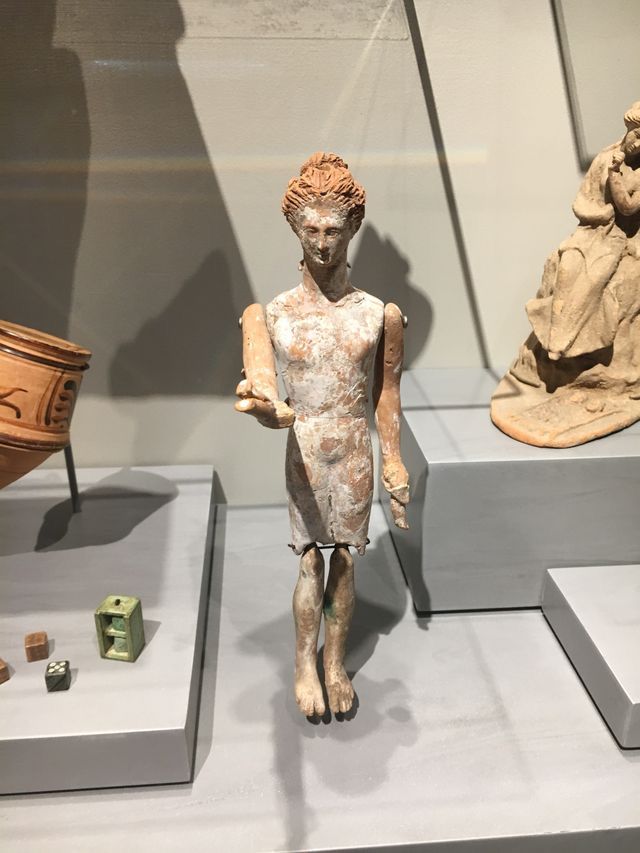
She would sit Metis on top of her bed and place her other toys on the in front of Metis, like subjects before their queen. Each toy would be brought forward and Metis would pass judgment on them. When she grew bored with this game, she would seek out Thalia, or Jason, or Luke, or Percy. If Percy wanted to play with her, then she would soothe her wounded pride at losing their last race by beating him at knucklebones.
Annabeth and Thalia spent their evenings weaving in Queen Hera's chambers while Luke, Percy, and Jason trained with the master of swords. Sometimes Queen Hera brought the girls to watch the boys spar. Annabeth found this boring. She did not see what was so interesting in boys banging swords together.
Luke was the best swordsman of the three boys but Jason promised to rival him someday.
"My little Heracles," Queen Hera would say, stroking Jason's cheek, whenever he won a match, "My little Achilles, doesn't he look handsome? A little blood lust suits him, don't you think?"
Jason crossed his arms and looked down at his feet.
Annabeth's only response was a yawn which she tried to suppress with her hand.
"Past your bedtime, is it princess?" Luke asked her.
"No," Annabeth replied, putting a hand on her hips, "It's just that I could be doing something useful like weaving, instead of watching you three horse around."
"If Princess Annabeth is so bored, then she should join us, and I have just the weapon for her," Luke pulled a small bronze dagger from his belt which he offered to Annabeth. She picked up the dagger and slid its blade from the scabbard. It had an exquisitely carved hilt and it's blade shone so that Annabeth could see her reflection.
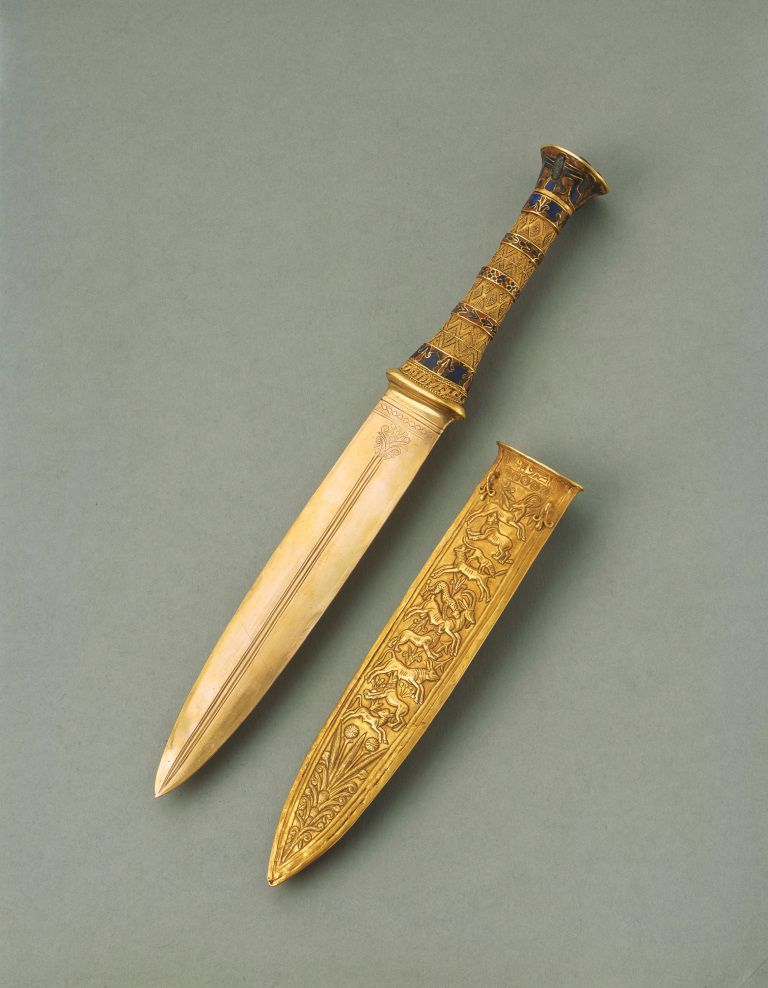
On the hilt was etched the word ἀκαχμένος (akachménos).
"Sharp-edged."
"Like the tongue of the Athenian Princess," Luke then turned to Queen Hera, "My lady, may I teach Princess Annabeth how to use this?"
"It doesn't hurt a lady to know how to defend herself," Hera mused, "There are too many dangerous men in this world."
When Luke had time to spare, he taught Annabeth the basics of self-defense. Annabeth hung akachménos on the golden chain her parents had given her which she wore around her waist.

The more time that Annabeth spent at the Macedonian Court, the more that Queen Hera's words, there are too many dangerous men in this world, made sense.
While Annabeth spent her evenings weaving with Thalia and Queen Hera or watching Luke, Jason, and Percy sword fight, King Zeus would drink and feast with his hetairoi (his following of lords who had sworn allegiance to him) until late in the night.
After watching the King and Queen of Macedonia together, Annabeth no longer believed in the romantic tale she had been told. During the day, they were cordial but aloof towards each other but during feasts, a drunken Zeus would roughly paw at Hera then get violent with her, shouting and throwing wine bowls, when she rebuffed him, and then satisfy his lust with a slave girl, whether she was willing or not. Queen Hera made sure to have the children sent off to bed before things got out of hand but Annabeth sometimes heard the rowdy carousing of King Zeus and his hetairoi and the ecstatic moans or agonized screams of the slave girls. Several times a year, one of the maids who served Queen Hera was sent away with a large belly: Leda, Europa, Danaë, Io, Semele, Alcmene...Annabeth lost quickly lost track of all of them.
"Fine work, my dear," Queen Hera said as she looked over the tapestry that Annabeth was weaving. It depicted the Chase owl flying over Annabeth herself, standing between her parents, King Frederick and Queen Athena. She then cast her eyes on the work that Thalia had done. Thalia was supposed to be weaving an image of a silver crescent moon over a white deer but had not made much progress. Queen Hera shook her head in disappointment and Thalia sulked.
Annabeth felt bad that Queen Hera seemed to prefer her to Thalia, her own daughter. Annabeth was courteous and well-behaved while Thalia chaffed at being inside, having to behave when she could be outside, running and exploring. The two girls admired each other for the qualities that one had which the other lacked.
Drunken shouting was heard from the corridor outside of Queen Hera's chamber. The doors swung open and King Zeus, with his hetairoi, forced their way in.
"Get them out of here," Queen Hera instructed Amalthea, the nursemaid who looked after Annabeth and Thalia.
Amalthea grabbed the girls by the hand and dragged them out of the room. Annabeth turned around to see King Zeus grab Queen Hera and kiss her then throw her on the bed and hike up her skirt. Queen Hera broke away from him and he stalked her around the room like a predator. He picked her up and carried her over to the bed.
"Come, Princess," Amalthea whispered to Annabeth, "It's time for bed."
Annabeth refused to go into the koraiceum and stayed in the hallway, crying. She could hear the sounds of a struggle coming from Queen Hera's chamber. Queen Hera managed to fight King Zeus off of her and shouting and swearing like a maenad, sent him out of the room.
Percy was returning from his sword training when he found Annabeth, crouched against the wall, hugging her legs and sobbing.
"What's the matter, Wise Girl?" he asked, kneeling beside her.
She answered him in continued sobs. He sat down next to her and let her rest her head on his shoulder.
"It's alright, you can tell me when you're ready."
"You're still a Seaweed Brain," she replied, choking back tears, "But I'm glad you're my friend."
Bạn đang đọc truyện trên: AzTruyen.Top